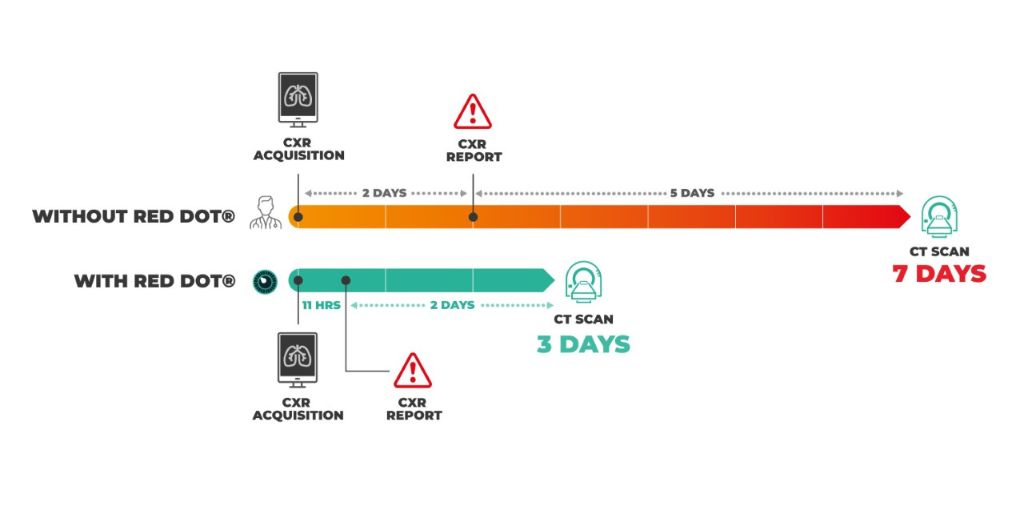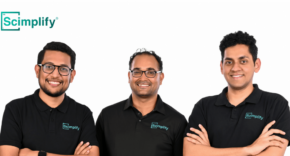0
16th June 2022 8:00 am

Somerset NHS Foundation Trust has become the first in the UK to study the performance of a pioneering AI algorithm for detecting lung cancer from x-rays.
The trust has been testing whether the award-winning Behold.AI can help it meet national targets for lung cancer diagnosis.
Its initial results suggest red dot® has played a part in helping them more than halve the time from initial x-ray screening to a CT scan, the gold standard for detecting lung cancer.
“There’s been a lot of buzz about AI at radiology meetings, but there’s little experience of using it in an NHS trust,” says Dr Paul Burn, Consultant Radiologist at the trust. “We embarked on a bottom-up initiative to test the algorithm, with the aim of helping us improve our referral times.”
“We have a fairly elderly patient population, which may make it harder for AI imaging solutions to be effective because of a higher incidence of abnormalities that show up on x-rays, such as scarring and calcifications,” he adds.
By prioritising which x-rays need urgent attention from a radiologist, the AI helped reduce the time from chest x-ray to CT scan from seven to 2.8 days, supporting the trust to meet its 28-day cancer diagnosis target. As part of the study, the trust also adjusted its next-day booking pathway for CT scans, the next stage in the lung cancer referral process after a chest x-ray.
The trust and Behold.AI found that of the 3,794 chest x-rays reviewed by the red dot® algorithm over a three-month period, the average time for a result to enter the hospital systems was 16 seconds.
The trust and Behold.AI found that of the 3,794 chest x-rays reviewed by the red dot® algorithm over a three-month period, the average time for a result to enter the hospital systems was 16 seconds.
The red dot® algorithm, which was developed in collaboration with NHS consultant radiologists, provides two outputs – a subset of abnormal x-rays with a high probability of lung cancer, and another subset of x-rays (high confidence normal) with a very high likelihood of being normal.
Of the 3,794 chest exams, the red dot® service classified 562 (14.8%) as high confidence normal (HCN). In 13 cases, radiologists disagreed with the model’s classification as HCN, a negative predictive value (NPV) of 97.7%. None of these discrepancies were considered clinically significant.
“High Confidence Normal results are an obvious opportunity for where AI can be used in the future,” he says. “Particularly for trusts with a big backlog reporting problem.’’
Pioneering AI start-up Behold.AI recently won Best UK Digital Health Solution for red dot® at the Prix Galien awards ceremony on 12th May, often considered the ‘Nobel Prize’ of health technology.
Pioneering AI start-up Behold.AI recently won Best UK Digital Health Solution for red dot® at the Prix Galien awards ceremony on 12th May, often considered the ‘Nobel Prize’ of health technology.
Simon Rasalingham, CEO and Chairman of Behold.AI, said in his Prix Galien UK award acceptance speech, “When we talk about the next big problem after COVID, it’s going to be the NHS backlog which will reach 12 million patients, nearly a quarter of the adult population of the UK. The peer reviewed evidence we’re building up shows that if we roll this technology out nationally we can add in the equivalent of 233 NHS consultant radiologists, which is equivalent to 255,000 hours of consultant time per year.”
Simon adds: “Early stage lung cancers are often missed by x-rays. We believe that our technology can pick up 22,000 more cases of lung cancer every year, giving these people a significantly better chance of beating the disease.”
Simon adds: “Early stage lung cancers are often missed by x-rays. We believe that our technology can pick up 22,000 more cases of lung cancer every year, giving these people a significantly better chance of beating the disease.”
Dr Michael Marsh, South West Medical Director NHS England and NHS Improvement said: “The pioneering work carried out by the radiology team at Somerset NHS Foundation Trust to test the AI technology in a hospital setting is a great example of innovation taking place in the South West NHS to reduced waiting times and improve outcomes for patients.”
Patricia McLarnon, Manager of the Somerset, Wiltshire Avon and Gloucestershire Cancer Alliance (SWAG) said: Somerset, Wiltshire Avon and Gloucestershire Cancer Alliance embraces a positive culture towards innovation and how it can support achievement of the Long Term Plan ambitions and cancer recovery. We were pleased to offer funding to support this, and thank Somerset NHS Foundation Trust and in particular Dr Paul Burn for testing this innovation locally and helping build the evidence required to develop the innovation further so that it is recognized as a mechanism to improve outcomes for cancer patients.”
Patricia McLarnon, Manager of the Somerset, Wiltshire Avon and Gloucestershire Cancer Alliance (SWAG) said: Somerset, Wiltshire Avon and Gloucestershire Cancer Alliance embraces a positive culture towards innovation and how it can support achievement of the Long Term Plan ambitions and cancer recovery. We were pleased to offer funding to support this, and thank Somerset NHS Foundation Trust and in particular Dr Paul Burn for testing this innovation locally and helping build the evidence required to develop the innovation further so that it is recognized as a mechanism to improve outcomes for cancer patients.”












